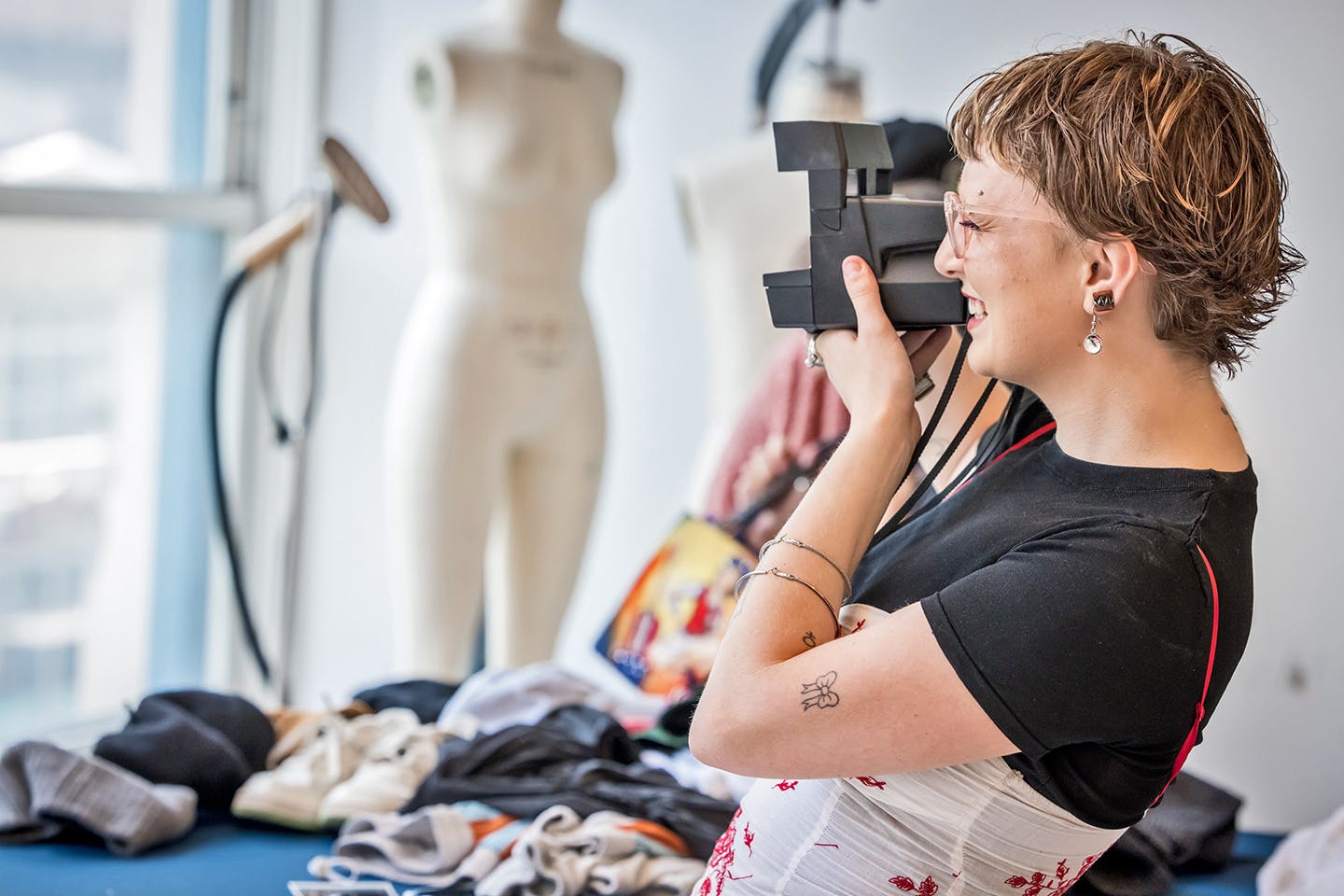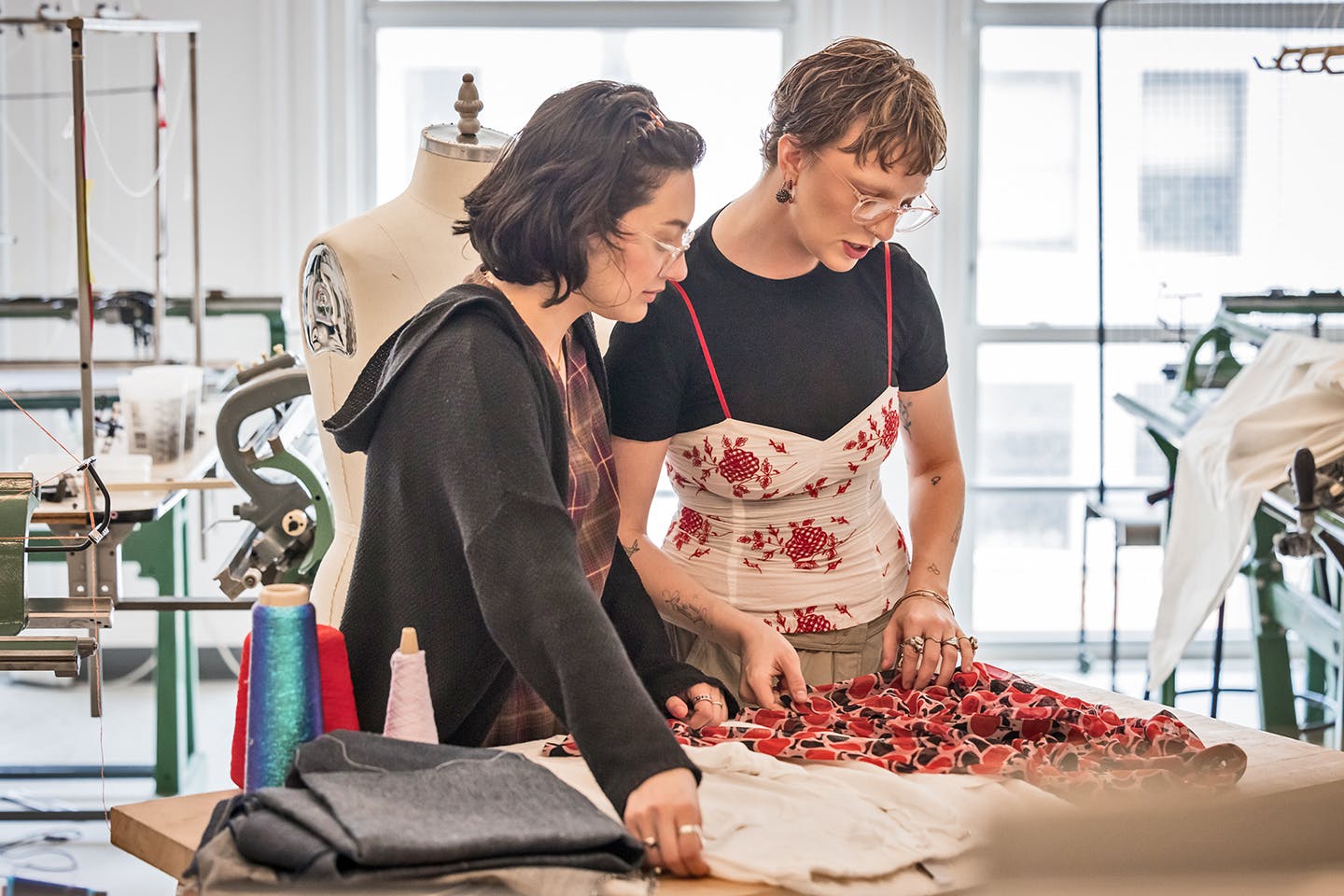Learn to Design the Future of Your World
Parsons School of Design
Could the future of fashion lie in secondhand clothing?
Eliana Shoffner, a Texas native and recent Eugene Lang College and Parsons School of Design graduate, certainly thinks so. For years she’s been organizing clothing swaps, events at which participants exchange
still-wearable items for garments they will use.
“When you shop for and wear used clothing, the pieces have stories that go beyond you and the two or three people who owned them beforehand,” she explains. “The concept of a free store or a clothing swap is so different from having to buy clothing. It’s
seeing someone wearing something you owned and thinking, 'That was trash to me, and now it’s treasure to them.’ It’s the freedom to express yourself.”
Although she recognizes that humans are “accustomed to wanting newness and new things all the time,” Shoffner believes in promoting sustainability through community-oriented efforts to distribute pre-owned clothing. Such efforts to provide clothes for
people from all socioeconomic backgrounds is an essential part of her activism.
“Thinking about ways to improve access to affordable clothing and free clothing is probably my top concern,” she said. “I always consider the immediate needs of the people around me. Are the homeless people near us clothed? Are the people in our shelters
clothed?”

Two years ago, Shoffner decided to organize her own clothing swap along with Camilla Ozaeta, a hometown friend and New School classmate. “We were living in an apartment in Bushwick over the course of lockdown and online school, and we just started to
share clothes and cut up our clothes and go thrifting a lot and play around,” Shoffner said. “I thought, ‘What if we open this up to a bunch of people who need to get rid of their stuff and don't have a place for it?’ My friends said, ‘Yeah, that
sounds cool.’”
Shoffner introduced the idea to other classmates and received guidance from a senior with experience organizing swaps in Maryland, who provided her with valuable insights into the process of organizing and hosting swap events. Shoffner was inspired to
pursue the idea further. She partnered with Ozaeta, and the duo received a grant from The New School’s Office of Civic Engagement and Social Justice to fund their new project.

Today Shoffner and Ozaeta operate NYC Community Wardrobe, a free popup “store” and clothing exchange. It’s a venture that owes its existence to the knowledge and experience Shoffner acquired at The New School.
During the college selection process, Shoffner initially applied to several fashion programs but found herself attracted to The New School.
“When I got accepted to The New School, I was automatically admitted to the Bachelor’s-Master’s program,” said Shoffner. “I knew from that moment that I wanted to pursue a liberal arts background at Lang and then take
advantage of a master’s program at Parsons that could allow me to go more into depth in theory and practical fashion rather than fashion design. I was interested in taking advantage of the resources at The New School and really excited to work with
professors and faculty who were involved in their fields outside of the classroom.”
In Secondhand Fashion, one of Shoffner’s final master’s classes at Parsons, she studied the social media patterns of two clothing swaps for inspiration and came away with crucial knowledge.
“The thing about social media is that you can provide people with resources in addition to spreading and sharing information about the logistics of your clothing swap, like when it will happen and how to do it,” she said.
Clothing swaps, after all, aren’t just good for keeping the community clothed; they’re important for sustainability. Of the 100 billion garments produced each year, roughly 92 million tons end up in landfills. Experts predict that if no effort is taken
to reduce fast fashion waste, the industry’s global emissions will likely double by the end of the decade. Efforts like Shoffner’s may be localized and operate on a smaller scale, but they are essential in normalizing clothing swaps and educating
the public about their importance, especially through social media.
“Engaging with Instagram accounts and using our own gave us the opportunity to explain the ethos behind our project. What does putting your clothing into a swap mean versus donating it or throwing it out in the same places that everyone else in New York
City is? I think in that way, social media can really teach you and open you up to new communities.”

Shoffner is dedicated to finding alternative locations for clothes remaining from previous swaps, aiming to avoid simply donating them and instead exploring options like textile repurposing or organizing other clothing swaps in different spaces.
“I’m at this point where my friends and I have graduated, and we’re trying to see how we can expand this beyond the school and our peers and our closest communities that already know about it,” she said.
Shoffner has also found ways to make her swaps more accessible to people of all sizes and gender identities. She decided not to organize the clothing by gender or season, as in retail stores, and encourages customers to choose only items that are true
to their size, rather than selecting oversized items, as there are other people who might need them. She has even offered on-the-spot alterations, such as opening up the seams on sleeves that were too tight.
Unsurprisingly, Shoffner’s own wardrobe consists almost entirely of secondhand clothing. When she’s not participating in clothing swaps, she is shopping for used items at vintage stores. This tradition began in her childhood, when she often went to thrift
shops to look for birthday dinner outfits and school attire. Shoffner found that many of her New School classmates had similar experiences and shared her affinity for pre-worn items.
“In school, especially the last year, we were able to be in person, thankfully, and most of us had our masks off, and so we could engage with self-expression in a more altruistic way,” Shoffner said. “The conversations we had around style were about experimenting
with things outside of our comfort zones. A lot more people are thrifting lately, especially in the New School community. Everyone is wearing something that’s unique to them.”
Shoffner envisions a future where clothing swaps like hers have become the norm and she and her peers continue to pursue creative, imaginative means of repurposing fashion while aiding their local communities.
